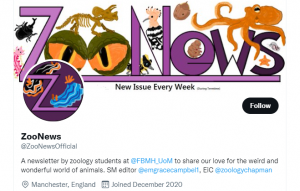Teacher of the Year 2021 (FBMH): Education, Engagement and Entertainment

Active learning and being an entertaining educator
To me, entertainment is an incredibly important element in educating people effectively, and particularly in holding students’ attention in lectures and seminars. Millions of people watch David Attenborough documentaries, which is essentially zoology, so I’m lucky in that regard: it’s an engaging and inherently fascinating topic. In general, students on the course are already switched on and are active participants in their own education. However, I do think it’s possible to make any topic more engaging.
When I worked in Sweden as a Research Fellow there was this idea of dismantling the perceived hierarchy; breaking down the barriers between academics and students and making everyone partners and collaborators in the learning experience. Rather than have a learned professor handing out crumbs of hard-earned knowledge to eager students, the learning was active and undergraduates involved in their own education in a more direct way. It wasn’t easy to incorporate this into the British teaching methodology at first, but Covid forced us to innovate and bring in new ways to engage students in their own learning, which has been the silver lining of the pandemic for me.
An example of this is the weekly Zoom workshops we ran, where we discussed and debated key topics related to the content covered that week. I set out some ground rules, including making sure people have a web-camera on as a baseline so that we could all feel like we were together in a room, and then my role was more like moderating and guiding the conversation between students, managing their flow of interest, and helping then explore the themes of the week’s lectures.
Student partnership, and ZooNews.
Student partnership is vital in building this sort of active engagement with learning. My own approach took shape when I began publishing ZooNews, which is a popular-science style online magazine/newsletter. I started by writing and distributing it myself to all the students on the course. Then after a year of doing so, I opened the floor to second- and third-year students contributions. At this point it had a few hundred subscribers, and lots of students volunteered to help and get involved

Every week, they could send in an article on anything zoology–related that they wanted. We built up this core group of writers, who wrote aboutall kinds of topics, from cutting-edge new zoological research and discoveries to local news on seminars and events within the University, like an online bulletin board. Whilst the topics can be academic and serious, I encouraged writers to incorporate humour too, by building puns into the titles. It even turned out one of the student partners was an skilled cartoonist, who we got involved in drawing cartoons for the magazine (as you can see in the image above).
Partnership through publishing
As a result of this progress, I have been able to hand over the reins to students occasionally with guest editing when I’ve been busy. It’s a surprisingly straightforward way of integrating student partnerships into my pedagogy, gently encouraging students to get invested in their writing and taking ownership of the project. During lockdown, it was particularly important for students to be involved, as one way of battling the challenges of feeling increasingly atomized and isolated.
I think your methods always depend on what your goal is as a teacher. My goal in this case was to build a learning community within the zoology programme, to give our students a sense of place and belonging here at Manchester, and ownership over their own learning trajectory. If you want people to care about the work they do, you have to give them a stake in being involved in the first place. The challenge comes when considering the balance between the student and staff voice in learning design and outcomes. The student voice is important but we as teachers have most of the expertise, particularly in designing the best ways to teach our undergraduates and manage our programmes. The trick is building something that students are engaged in and involved in, so they are collaborators. ZooNews was perfect because it was something extra – it’s not assessed, but functions as a way of giving undergraduates the opportunity to gain real world experience, while feeling invested in their education. It has acted as a vehicle to promote and showcase their knowledge and passion and has really helped build a strong community within the zoology programme.
Cup of tea with the Programme Director
I started ‘Cup of Tea with the PD’ Zoom sessions for 3rd year Zoology students during Lockdown where students could discuss any issues they might have encountered with their learning. Other staff and I in the school (such as Jen Mcbride) used this as a kind of drop-in hour. Often students just came to chat and have some interaction with me and their peers. I also created a seminar series, inviting colleagues from the field of zoology from a range of careers (including non-academic settings such as museum curators) to give talks to our students. This has given me a platform to promote the diverse reality of modern science and challenge the cliché that zoologists are all white middle-aged men! This was a project that students could really feel involved with and gave them insights into life beyond university in a field that doesn’t really have a set career path.
Students are already engaged
There can be a cliché of students not turning up, or of only being at Uni to party, which in most cases is simply not true. It’s important to remember that our undergraduates are incredibly passionate about their subjects and their commitment and enthusiasm is something I find really inspiring. We’re teaching the next generation of conservationists, policy makers, scientists and educators who will go out into the world to tackle some of the greatest challenges humankind has ever faced. And to me that feels like a huge privilege.
Further information:
- Follow @ZooNewsOfficial on Twitter, or Email ben.chapman-2@manchester.ac.uk to sign up for the newsletter!







0 Comments